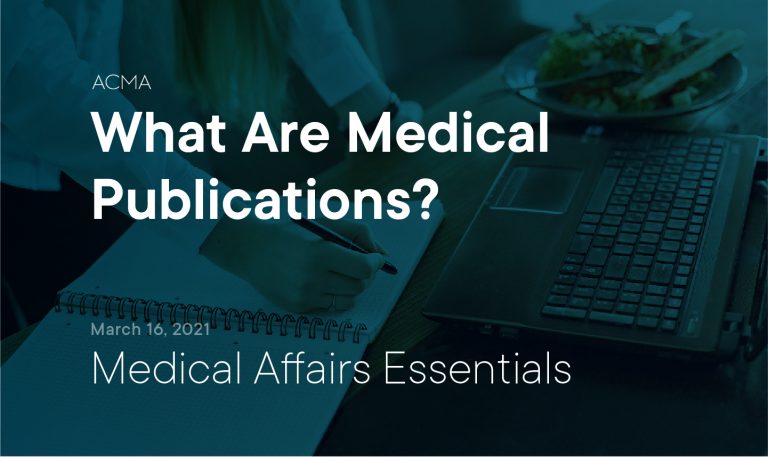The ACMA has taken its message about the importance of board certification for medical affairs and MSL professionals to Congress. On March 24, ACMA CEO and Founder, William Soliman, delivered a congressional briefing to members of the House Energy and Commerce Committee’s Health Subcommittee. The ACMA’s progress on this issue means that the future of board certification for medical affairs and MSL professionals is very bright.
As Medical Affairs continues to grow within the pharmaceutical industry, providing proper professional development and setting standards for these professionals is critical. Traditionally, pharmaceutical companies either:
- Develop their own internal training or
- Work with third-party vendors to build programs for them

While this can help onboard new hires, there are several limitations to this traditional approach. That’s why the future of board certification aims to address these limitations.
10 Reasons Why Traditional Medical Affairs Training is Limited
- It is a ‘one & done,’ focusing primarily on proper onboarding for new hires. There is no plan put in place to assess continued professional development.
- Vendors are NOT accredited training providers. What that means is that they do not meet any type of standards when it comes to learning design, process, technology or proper assessments.
- Non-accredited training does not lead to a qualification or any credits awarded.
- Traditional training is not externally recognized outside the company which limits employee motivation and development.
- Traditional training is not externally recognized outside the company which limits employee motivation and development.
- Traditional training typically requires a minimum level of knowledge is met does little to assess assess progress over time.
- Because non-accredited training doesn’t have to meet any type of external measures of quality or assessment, it poses a risk to pharmaceutical companies if they are audited.
- Finally, today’s training often lacks consistency across US & Global Medical Affairs organizations creating gaps and putting certain teams at a disadvantage.
Accreditation Matters
The Accreditation Council for Medical Affairs (ACMA) is the only accredited provider of professional development and certification for Medical Affairs & medical science liaison professionals working across the pharmaceutical, biotechnology, medical device and diagnostic industries. Accreditation indicates that you have met and/or surpassed industry standards for training & certification. The Board Certified Medical Affairs Specialist (BCMAS) program has become the industry standard of excellence. The BCMAS has provided thousands of medical affairs professionals and MSLs around the world with a professional certification that demonstrates their commitment to these standards.

The ACMA is accredited by the International Association for Continuing Education & Training (IACET/ANSI). The ACMA is also a member organization with the Institute for Credentialing Excellence and, through its partnership with Scientia CME, is a joint provider of Continuing Medical Education (CME) & Continuing Education (CE) for physicians, pharmacists, and other healthcare professionals. This level of accreditation indicates that the ACMA offers the highest quality of training and certification. The robust quality management system, innovative learning design, optimized pedagogical techniques and proper learner support are key elements to ACMA’s success.
Regulators & Accreditation
Regulators and government agencies are increasing recognizing the future of board certification for medical affairs and MSLs. Companies that use an accredited provider of professional development help safeguard and minimize risk for their organizations. This becomes particularly important when concerns arise over:
- The competence of your team members
- Issues related to professional ethics
- Concerns over quality systems and operations
- Issues with compliance

The ACMA’s presentation to Congress addressed the real-world applications that demonstrate, on a daily basis, the value that board certified Medical Affairs and medical science liaison professionals contribute to new drug development and the delivery of high-quality healthcare. The briefing also underscored the need for certified professionals to provide education to healthcare providers and stakeholders in the field.
Shaping the Future of Medical Affairs
The ACMA continues to partner with companies who are raising the bar for their organizations by offering accredited training & certification programs. There are several benefits afforded to both the company and employees. By partnering with the ACMA, pharmaceutical companies can ensure that all individuals who successfully meet ACMA standards will receive a certificate of competence, which is accredited and recognized in the US & internationally.
Moreover, several studies have shown that certification:
- Improves employee motivation and performance
- Increases team morale
- Ensures that a minimum level of competency is set across the organization.
These objectives establish consistency, minimize risk, provide peace of mind and improve the chances for more effective & compliant engagement with key opinion leaders (KOLs). As a matter of fact, the ACMA surveyed more than 1000 KOLs and found that 87% indicated that partnering with pharmaceutical industry professionals with an accredited certification would help them feel an increased sense of trust and credibility.
As we reflect on the opioid crisis and other issues that have plagued the pharmaceutical industry in recent years, it is critical that Medical Affairs works together with Compliance and Commercial teams to raise the bar for their organizations. Doing so is not only the right thing to do for their company, but more importantly, the industry owes it to the patients and healthcare organizations it serves.




